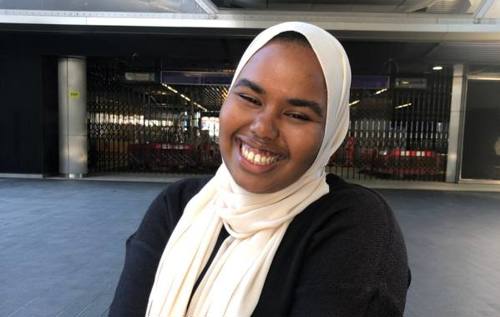“Every day I make sure I have at least one thing I’m grateful for": Safia’s story
17 May 2023
Safia, 24, was diagnosed with peripheral and axial spondyloarthritis in 2021, but doctors originally thought she had rheumatoid arthritis.
From getting the right diagnosis to focussing on her mental health, Safia tells us what she’s learnt along the way and stresses the importance of having hope.
“I’d wake up and it would feel like someone had stabbed me in my shoulder.”
I got diagnosed with rheumatoid arthritis in October 2019. I started to get odd pains in my knees, like when I did lunges at the gym. I’d get random bouts of jaw pain, too. I’d wake up and it would feel like someone had stabbed me in my shoulder. My hand would be swollen and stiff.
The GP did some blood tests which showed a problem. That, alongside me telling them I have some people in my family who have arthritis, got them to refer me to a rheumatologist. They did an ultrasound on my hand and listened to me talk about my joint pain. Because of that I got a diagnosis of rheumatoid arthritis.
I walked into that appointment as someone who didn’t have anything on their health record and walked out with this incurable condition. It was quite scary. I wish I’d brought my mum with me to the appointment.
“I started getting pain in my hips and increasing stiffness in my spine.”
I tried methotrexate and the side effects were dreadful, I was throwing up all the time. At the start of the pandemic, I had regular blood tests and got to a point where it was ok. But during the second part of 2020 I got a flare in my chest – it felt like someone had stabbed me. I didn’t know that was a symptom of arthritis.
New joints started getting impacted, I started getting pain in my hips and increasing stiffness in my spine. The rheumatologist wanted to increase my dose of methotrexate, but I didn’t want that.
After waiting a very long time, the rheumatologist sent me for an MRI to look at my spine and hips. I knew there was something wrong. They told me my diagnosis had changed to peripheral and axial spondylarthritis and they put me on biologics.
“At the beginning of your twenties, you visualise your life going a certain way and I hadn’t visualised it being like this.”

When I got the new diagnosis, I decided to go part-time to four working days. Pain relief and the meds weren’t working. There was a long waiting time to get the biologics.
Between May and August was the hardest time I’d ever had since being diagnosed. I thought the flare I’d had before was bad but that was nothing compared to this. It was quite overwhelming.
I was given pain relief and told to wait for the biologics, but I have asthma, so Naproxen was making me wheezy. I had to keep coming back and asking for something else to help. I lost the most confidence in this time, even in terms of independence and having a career.
At the beginning of your twenties, you visualise your life going a certain way and I hadn’t visualised it being like this. I was in my second year of working and had already decided to go part time. It was a difficult time, not only with my condition but also with everything surrounding it.
“I’m doing the best I can and that’s all I can do.”
After starting the biologics at the end of 2021, I had a review with my doctor as the hip pain had decreased a lot, but the back pain was still there. She increased the dose and it has helped a lot.
Going back to the gym has helped. Even if it’s once a month, I’ll just do it on my own terms. That has increased my confidence a lot.
During the re-diagnosis process, I was in pain every day. This was my new normal. It was mentally draining. I don’t remember much because I was in bed, but when something’s distracting you that much you can’t enjoy your hobbies like reading or seeing friends and family. I was on edge. I didn’t like it – that’s not who I am.
But as rubbish as this thing is, I know now to change that mindset and be aware that at the end of the day I got through yesterday and I’ll get through today. I’m doing the best I can and that’s all I can do.
I used to get so overwhelmed thinking about the future and how I’m going to cope, how I’m going to progress in my career. But I think even if I didn’t have this condition I’d worry about those things. It’s easier to think about things in small increments – don’t think about next month, just think about tomorrow. If it’s a good day take advantage of it, and if not then just rest.
“Every day I make sure I have at least one thing I’m grateful for.”

In terms of making me feel better, it depends a lot on my mental health and those ups and downs. For me, I think it’s about gratitude and even something small like my coffee tasting really nice that day or laughing at a funny joke. When I’m unwell and I start to feel a bit better I realise there are things I took for granted.
When I was first diagnosed, I didn’t want my condition to define me. But looking back, my condition has made me a more empathetic and understanding person. I’ve learnt how to prioritise a lot better.
People who have conditions have a new way of thinking; they know how to work around problems. It does have its strengths. I might not appreciate them now, but I will look back and see that it has changed me for the better. It’s given me a new perspective on life. I am appreciative of that.
I understand a positive mindset won't cure this condition, nor am I advocating toxic positivity. I think it's crucial to see the positives in your current predicament and to utilise it as a tool to keep fighting. This condition will test your mental health as much as it does your physical.
It’s temporary. It’s not forever, and it does get better. I wasn’t hopeful in those times, but I think I would’ve got through it easier if I was.
We’re here whenever you need us
- If you need advice or support, you can call our free helpline on 0800 5200 520
- Chat to our Arthritis Virtual Assistant
- Join our online community
- Stay in touch and follow us on Twitter, Facebook and Instagram.
- If you or a family member under the age of 25 has arthritis, we run a Young People and Families service that provides information and support and puts on a range of events across the country.